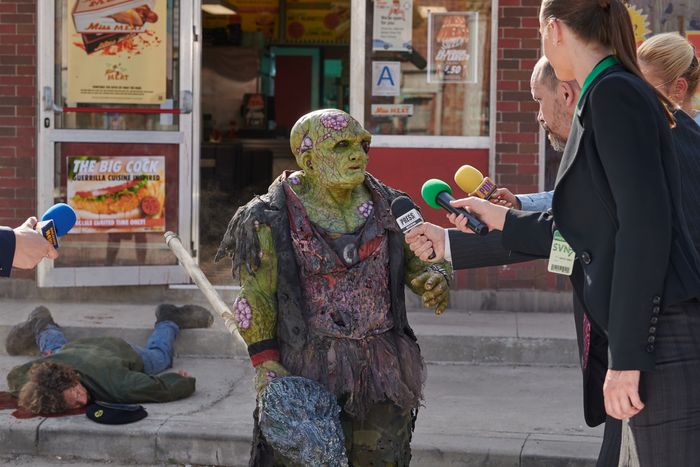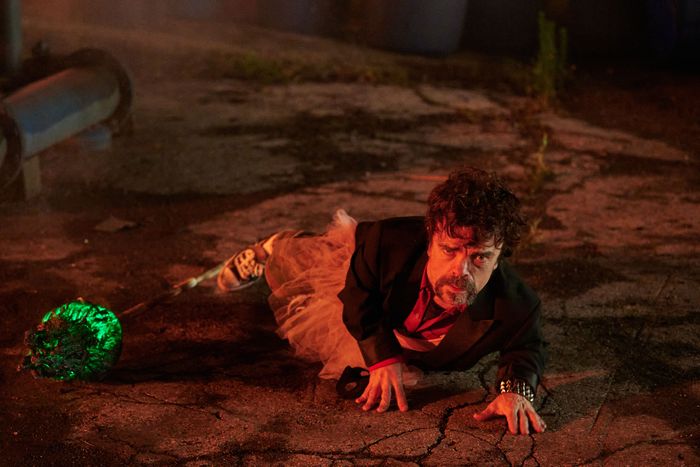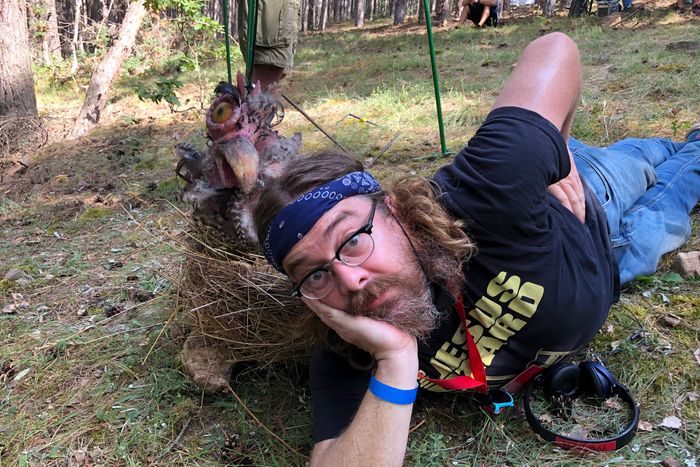
Photo: Yana Blajeva/Legendary Pictures
Whither the B-movie? Movies like The Toxic Avenger (1984) — an unbridled superhero spoof that mixed together black comedy and body horror in its mockery of everything from wellness culture to the U.S. government — don’t really get made anymore, which is probably part of why The Toxic Avenger (2025) had such a hard time getting in front of audiences. Macon Blair’s update to the legendarily schlocky Troma classic played Fantastic Fest and Beyond Fest two years ago and earned praise from genre fans for its wacky humor, its social critiques of modern America, and Peter Dinklage’s performance as Winston Gooze, the new Toxic Avenger. Winston is struggling: A single father to teen son Wade (Jacob Tremblay), he receives a dire medical diagnosis as a result of his work as a janitor at a biohazard-producing Big Pharma company run by the maniacal Bob Garbinger (Kevin Bacon). As Winston becomes the avenging Toxie, he explodes enemies’ heads with his radioactively powered mop, aids a whistleblower (Taylour Paige) determined to take down BTH, and tries to be a better dad to Wade — all of which makes for a surprisingly tender film, amid all the gore and grotesquerie.
But for two years after its festival debut, The Toxic Avenger sat shelved without a distribution deal. In the meantime, a whole other movie written by Blair and starring Dinklage got released (2024’s Brothers), and Blair served as an executive producer on his childhood friend Jeremy Saulnier’s film Rebel Ridge. He feared that his movie could go the way of Coyote vs. Acme — a fully completed film written off by its studio as a tax loss and “vanished” into a vault. Finally, in late January, an update: Cineverse, which ushered the Terrifier horror franchise to box-office success, acquired the rights to the film in a deal with Legendary Entertainment with plans to release an unrated version, which opens in theaters today.
Blair admits to questioning his own sensibilities during the film’s years in limbo. “I did wonder, Would I have done anything different? I really thought, Maybe I should have done this or that or the other,” he says. Online reports that quoted producers calling his film “unreleasable” didn’t help. But now, with his film finally in theaters today, he recalls the experience with clarity and perspective.
You finished filming in August 2021. You premiered at Fantastic Fest in September 2023. What were your expectations going into the festival? Did you expect to sell it to a distributor immediately?
I didn’t. I try not to take anything for granted. But I was certainly hoping so, and Fantastic Fest is geared to a movie like this. A week or two after that, we did Beyond Fest and both of those audiences responded very favorably. We were all delighted, and I was hoping that it would get picked up soon after that. And then time went on. I’m never involved in the sales process, but I would get little updates, and I would hear that some people were interested — or maybe they weren’t interested enough. And over time, that excitement coming out of the festival seemed to contract a little bit, and I did start to get nervous, honestly. Legendary was nothing but hugely supportive the whole way through, so I was not worried about them losing interest at all. They were totally behind it. But I was also aware that it’s not exactly a mainstream movie in a world where a lot of the things that are coming out are Marvel movies or whatever. I really enjoy those movies, but they appeal to a very broad audience, let’s say, and ours is perhaps a little more narrow in its appeal. And I started to feel like, Maybe the Fantastic Fest audience, the Beyond Fest audience, is not a big enough slice of the pie to get it out into the world.
But it’s also kind of out of my hands, and there was a nice, sort of freeing quality to it where I was like, I’ve done everything I can do. It’s off my plate now for, for better or worse. But I think that whatever happened in that interim period where it was in limbo allowed Cineverse to be like, “We’re gonna take this movie on,” and that was worth its weight in gold. Because the worst outcome would have been to have it get picked up by a place that wasn’t really interested, and just have it be an asset that goes on to streaming and then vanishes like a puff. But Cineverse really got it, and they were genuinely excited and enthusiastic about it. Coming off of Terrifier, they had a particular perspective on how to market a movie like this — and they were able to get it into theaters, which even from the beginning was not something I was taking for granted. Because of the way things are these days, a lot of stuff just doesn’t. There was definitely a period of, “Shit, what have we done?” But landing with Cineverse ended up being the best thing that could have happened.
Did you tell the team selling it to avoid a streaming-only deal?
No, no, not at all. I could have said what I did and didn’t want all day long, and they would have been like, “Noted.” Obviously I hoped for it to have a theatrical release, but that was totally out of my hands. The best I could do was wait for updates and be grateful to the folks at Legendary who were trying to do the distribution deals, and just let it be what it was going to be.
Peter Dinklage in The Toxic Avenger.
Photo: Yana Blajeva/Legendary Pictures
Did you ever think, Should I change the movie? when the deals weren’t happening?
No, because I don’t think there was anything to be done. What I mean is, the film’s personality is so baked into it at every step of the way. It was never like, “If you lose this scene, then it’ll be palatable.” It’s still going to be what it is, and if people aren’t digging that, they’re still not going to dig it. To me, the worst-case scenario — and it never came to this — was that it would just be considered a loss and get vanished. You hear horror stories about something like Coyote vs. Acme, and it absolutely crossed my mind that at some higher echelon, way above the Legendary creative group, some corporate decision-maker would be like, “According to our spreadsheet, this is more valuable as a loss.” But luckily it didn’t ever get that far.
A World of Reel post from July 2024 claimed to quote a producer who said the film was “too niche” and “unreleasable.” Did you feel that was an odd reaction? The Toxic Avenger is a recognizable property with a cast of recognizable actors, led by Peter Dinklage, Kevin Bacon, and Elijah Wood.
I remember seeing that. I had come out to visit Jeremy and we saw an anniversary screening of Green Room. I came out of the theater and checked my phone, and it said, “Toxic Avenger is unreleasable,” and I was just like, “Shit, man.” It did seem weird for exactly the reasons you just said. The movie is a little strange, but it’s pretty wholesome. It’s an underdog fighting against bad guys. It’s not confusing. It may not be everybody’s taste; that’s okay. But I was a little confused that it would be described as, “We have to keep this suppressed. It’s too fucking weird!” [Laughs.] And the other thing is, I felt like that was probably a game of telephone — someone said, “This is having a very difficult time getting released. I’m not sure if it’s gonna come out anytime soon,” and somebody was like, “It’s unreleasable!” Anyway, that was not super-fun to hear. But I took it with a huge grain of salt. I was not like, Oh, that’s done. I had just talked to the executives at Legendary two days earlier and knew that they were still hard at work and had conversations going with different people, one of whom was Cineverse.
Given your relationship with Netflix, for which you directed 2017’s I Don’t Feel at Home in This World Anymore, it was surprising it didn’t pick it up. But I’m also glad it’s getting a theatrical release.
I am too. I would be very happy if the deal going forward for every movie — if I get to make other movies [laughs] — was, “You’ve got to wait two and a half years, but it will go theatrical.” I would say yes to that 10 out 10 times. With Netflix, I think part of it was that the people we worked with are no longer there. When I made I Don’t Feel at Home, they had Beasts of No Nation, too, and it seemed like they wanted to do stuff that is weird and beyond what mainstream studios typically do. I think their appetite for that may have compressed a little bit. And I’m speculating here, maybe that’s why they didn’t want this one. But again, I wasn’t in the room for those conversations.
I know that Peter Dinklage has said the film is not a remake. What phrasing would you use?
I don’t think it’s a remake because it’s a different character. In the first one, he’s a teenager. He’s trying to get dates. He’s trying to be with the cool kids, and there are bullies, and it’s got this kind of adolescent dynamic. And I was like, “Let’s not go back to that same well again.” We repositioned it: He’s older, and the emotional thing that’s going on is more about his connection with his kid. And if we’re doing that, then it should be a totally different character with a different name. There’s a lot of different versions of Captain America, and that’s how I thought of it. I don’t know if “remake” is the thing — “reimagining,” “remix,” something like that. But it was never going to be, “We’re going to take the same story of a kid who’s working at a health club and the bullies are picking on him.” I wanted it to go in a different direction.
Right, Winston is a family man; he works for this terrible, polluting company; he grapples with his health-insurance company in a phone call. There are social-thriller elements. What did you want this version of The Toxic Avenger to say about our current world?
I didn’t have a list of points to make, but what I did want is, What’s the best version of an antagonist that I can make for this character, just to give him the most difficult struggle to contend with over the course of the movie? We thought about it less in terms of a General Zod or an equal opponent with dark powers. It was more like, The fucking system is impenetrable and poisonous. It would give him more than one way to tackle stuff as he went, and of course we add in a gang of bad guys that he can actually fight with and all that fun stuff. And if it ends up being unfortunately relatable because the phone system at the insurance company is impenetrable, then that’s something everybody can nod their head at and be like, “That shit sucks.” You don’t have to explain it. You don’t have to be like, “His powers come from this or that.” It’s like, “Yeah, dude, it sucks when you’re left with nothing and a rich person is keeping it all for themselves.” That’s very relatable for people.
Troma films are historically very gory, as is your version of The Toxic Avenger. When you were writing the script, how in depth were you getting in describing the violence?
From a preproduction standpoint, I tried to get specific so that we could arrange the schedule in a responsible way. It was a much bigger budget than anything that I have worked on before, but it was not unlimited. It was pretty tight. It wasn’t like we could just show up on set and figure it out. Beyond that, it was all geared toward what would get the biggest laugh, and what would be funniest in that given moment. Watching the original Toxic Avenger, somebody gets smashed in the face and you wince a little bit, but it also gets a chuckle, and that’s what I was chasing — having it be cartoon gross.
Was there any pushback from producers or the studio on the level of gore?
No, and I’ll tell you another thing. We were in postproduction and one of the producers floated the idea, “If you could add one more kill to this, would you want to do that?” The budget worked out where we could do one day of shooting, so not a whole sequence or a whole scene, but one kill. We were working very late on the sound design when this conversation came up, and in talking with the editors, I pitched this one gag, that Toxie would pull somebody’s intestines out of their butt. And without really thinking that through very much, I very impulsively wrote an email — in my mind, it was in all caps — to the head of the studio, “Toxie should pull somebody’s intestines out of their butthole!!” Exclamation point, exclamation point, send. This was at like 2 a.m. Afterward, I was like, “Why did I do that?” I didn’t know what was going to happen. But then the next morning, they wrote back, “Hot dog. Let’s do it.” They booked a little studio, and while we were in postproduction, we shot this two-second scene of a guy’s butt getting vacated by Toxie. Not only did they not push back, they pushed forward.
Director Macon Blair on the set of The Toxic Avenger.
Photo: Yana Blajeva/Legendary Pictures
There’s a bird in The Toxic Avenger that lives in the dump where BTH dumps its hazardous waste, and all of its feathers have rotted off and it’s got these huge bug eyes, and I’m obsessed with how goofy and lively it is. Was it a puppet? It would make such a perfect specialty popcorn bucket.
I’m not the popcorn-bucket boss, but if there were to be a Toxie popcorn bucket, I would love for it to have the little bird-hen on it. We called it the Nervous Red Warbler, and he was a puppet. We added a little bit of blinking and a little bit of eye movement later on. We had a great effects guy when we shot in Bulgaria. His name was Lyudmil Ivanov, and he built it in his little workshop and every day brought it to set. It was a rod puppet with a couple of points of contact, and it had so much personality. We ended up even adding it to some subsequent scenes just because I liked it. I’m a big Muppets and Fraggles fan. It’s meant to be Toxie’s reflection — he sees the bird and he sees a little bit of himself in there. But really, I wanted some Muppets in the movie.
Do you remember the first time you saw Troma co-founder and director Lloyd Kaufman’s original The Toxic Avenger?
I remember it very clearly. This was in the ’80s, when you would find movies to watch based on the video cover at the store. I remember seeing this crazy mutant with the tutu and the American flag. My buddy’s older brother was like, “You should check this one out.” I was just the right age, like sixth grade or so, so the sense of humor — kind of sophomoric, kind of juvenile, very over the top and absurd — really landed exactly as I guess they were hoping it could. This was right around the time when Jeremy and I and our little group of buds were figuring out how to make our own movies with somebody’s parents’ video camera. And there was something about Toxie, the tone of it, that we definitely stole from — ripping somebody’s arm off and hitting him with it, and having that be a joke. I remember thinking, These are just regular people that made a movie with their friends. It was very inspirational at the time.
I wrote several scripts that had that juvenile sense of humor, and monsters, and gags that were like, again, ripping somebody’s arm off and hitting them with it. None of these were based on anything, and they were expensive and R-rated, so basically unmakable. Then all of a sudden Legendary, which had partnered with Troma, approached me like, “Do you wanna talk about this?” and it occurred to me, This has all those ingredients that I was trying to do, but it has an IP attached to it and a studio trying to make it, so it could possibly actually get made. That’s what I seized upon: This is a way to make those same kinds of movies we were making in our neighborhood. I went in and was like, “It should be a guy in a suit, not CG. It should be rated R, and it should be very silly. It should be primarily a comedy, more so than an action movie or a horror movie.” Those are the three things I went in with and kind of braced for, “That’s not what we’re looking for.” But they called back and said, “That sounds great. Can we talk about it more?”
I’m curious how your experience with this film impacted how you feel about your style of filmmaking overall. Did it change what you want to make and don’t want to make?
What a great question. Nobody has ever asked me that. There was a time when it was sitting on the shelf for a couple of years, and before there was anything concrete with Cineverse, that I did wonder, Would I have done anything different? I really thought, Maybe I should have done this or that or the other. But then I felt, No. I did exactly what I pitched in that early initial conversation in 2019. That’s what I wanted it to be. I certainly would not want to go and be away from my family for six months and go to another country and put all this energy into something just to chase some ambiguous target of, “This is what it needs to get out.” I would rather find something else to do. I’m in preproduction right now on another movie, and it’s exactly what I want to do. I don’t know if it’s gonna be a smash success, or if it’s going to wind up in limbo for another two years. But I know I’m getting to do the script that I wrote, that I’m excited about, and I don’t start changing things up midstream. I wouldn’t know what changes to make, you know? It would just be a blind roll of the dice. I’m happy with the way things worked out, and if having a little period in limbo was part of the deal, then I get to learn from that, too, so that’s okay.
I know you reconnected with Sterlin Harjo recently after working on Reservation Dogs together. You acted in and directed a couple episodes of his upcoming show on FX, The Lowdown. Tell me about that and the film you’re in preproduction for.
Such a fucking awesome time The Lowdown was, man. Without getting too particular about things in the world right now, I really needed a job to sink my head into, and that one saved me. It was such a great experience. I think people are going to dig it. The movie is called The Shitheads. It’s with Dave Franco and O’Shea Jackson Jr. and Imogen Poots and Peter Dinklage, and it’s a road-movie comedy. It’s kind of like The Last Detail. We start shooting on August 25. This is one I’ve been trying to get made for some time now, and it’s come together. I feel very lucky. We’ll need to sell it. We’ll get that done, and then we’ll figure out what the plan is going to be.
Source link




